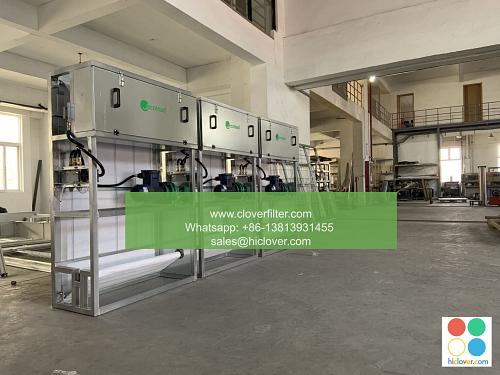Nestlé Canada’s Clean Process Zone Strategy: Automatic Roll Air Filters as a Key Component

Nestlé Canada, a leading food and beverage company, has implemented a Clean Process Zone Strategy to ensure the highest standards of quality and safety in its production facilities. A key component of this strategy is the use of Automatic Roll Air Filters, which play a crucial role in maintaining a clean and controlled environment. In this article, we will explore the benefits and applications of Automatic Roll Air Filters in Nestlé Canada’s Clean Process Zone Strategy, with a focus on Food Safety, Quality Control, and Energy Efficiency.
Introduction to Clean Process Zone Strategy
Nestlé Canada’s Clean Process Zone Strategy is designed to minimize the risk of contamination and ensure the production of high-quality products. The strategy involves the creation of clean process zones, which are areas of the production facility that are specifically designed to maintain a high level of cleanliness and control. These zones are equipped with advanced technologies, including Automatic Roll Air Filters, to remove airborne contaminants and maintain a clean environment.
Automatic Roll Air Filters: A Key Component
Automatic Roll Air Filters are a critical component of Nestlé Canada’s Clean Process Zone Strategy. These filters are designed to remove airborne contaminants, such as dust, particles, and microorganisms, from the air in the production facility. The filters are automatic, meaning they can be programmed to roll out new filter media at set intervals, ensuring continuous and efficient operation. The use of Automatic Roll Air Filters provides several benefits, including:
* Improved Indoor Air Quality: By removing airborne contaminants, Automatic Roll Air Filters help to improve the indoor air quality in the production facility, creating a cleaner and healthier environment for employees and products.
* Reduced Risk of Contamination: Automatic Roll Air Filters minimize the risk of contamination by removing potential airborne contaminants, such as bacteria, viruses, and other microorganisms, that could compromise product quality and safety.
* Increased Energy Efficiency: Automatic Roll Air Filters are designed to be energy-efficient, using less energy to operate than traditional filter systems. This helps to reduce the overall energy consumption of the production facility, resulting in cost savings and a reduced environmental impact.
Application Areas
Automatic Roll Air Filters have a wide range of applications in Nestlé Canada’s production facilities, including:
* Dairy Processing: Automatic Roll Air Filters are used in dairy processing areas to remove airborne contaminants and maintain a clean environment, ensuring the production of high-quality dairy products.
* Bakery and Confectionery: The filters are used in bakery and confectionery production areas to remove airborne contaminants, such as flour and sugar particles, and maintain a clean environment.
* Pharmaceutical and Nutraceutical Production: Automatic Roll Air Filters are used in pharmaceutical and nutraceutical production areas to maintain a clean and controlled environment, ensuring the production of high-quality products.
Conclusion
Nestlé Canada’s Clean Process Zone Strategy, which includes the use of Automatic Roll Air Filters, is a key component of the company’s commitment to quality and safety. The use of these filters provides several benefits, including improved indoor air quality, reduced risk of contamination, and increased energy efficiency. With a wide range of applications in various production areas, Automatic Roll Air Filters are an essential tool in maintaining a clean and controlled environment, ensuring the production of high-quality products and meeting the company’s Food Safety and Quality Control standards. As Nestlé Canada continues to evolve and expand its production facilities, the use of Automatic Roll Air Filters will remain a critical component of its Clean Process Zone Strategy.

